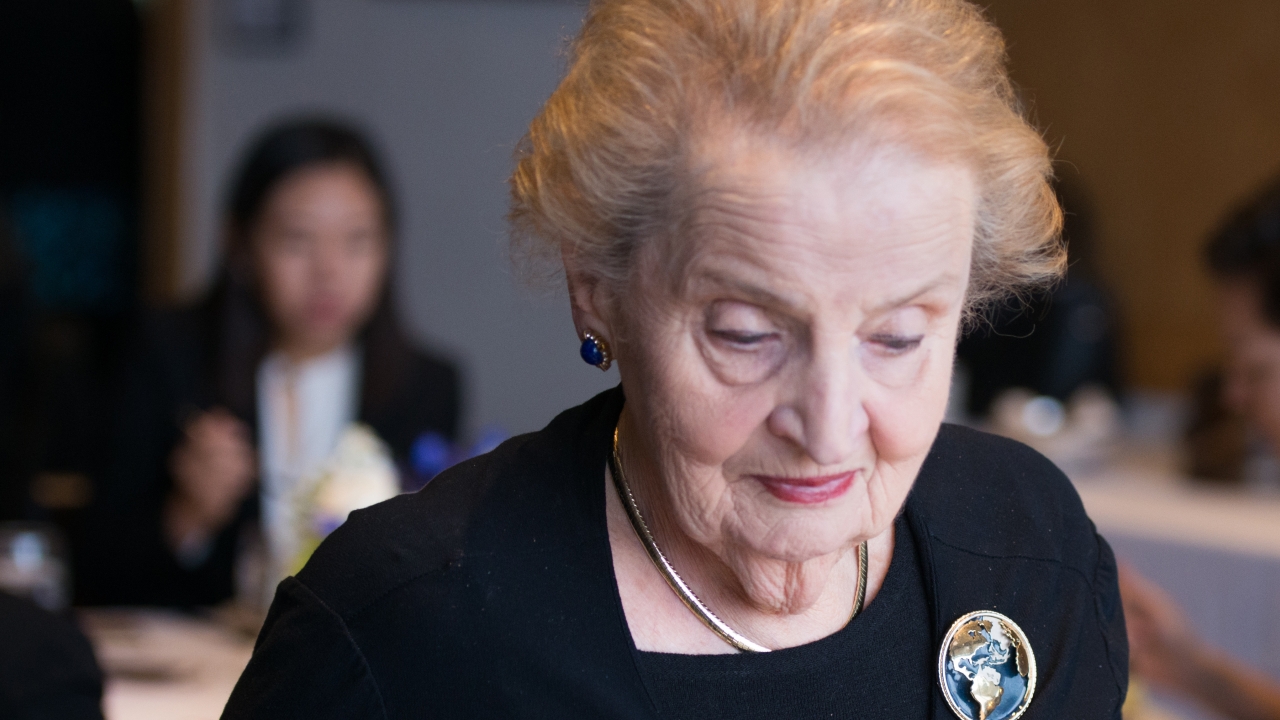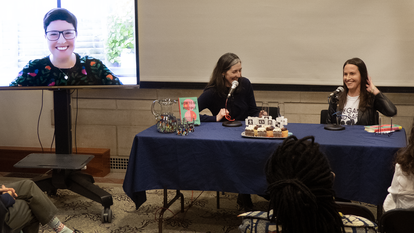Albright Institute Public Dialogue Examines the Sociopolitical and Geopolitical Ramifications of the Global Refugee Crisis

The Madeleine Korbel Albright Institute for Global Affairs at Wellesley College will hold its annual Public Dialogue with former U.S. Secretary of State Madeleine K. Albright ’59 on Sunday, February 26. The day-long event, “From Exodus to Action: Claiming our Common Humanity in the Refugee Crisis,” will begin with a keynote address by Albright, followed by two panel discussions on the sociopolitical and geopolitical ramifications of the global refugee crisis and the demands of advancing beyond resettlement into rebuilding society.
Speakers will include international reporters, nonprofit leaders, and academics, as well as George Papandreou, president, Socialist International, and former prime minister of Greece; Anne C. Richard, assistant secretary of state for population, refugees, and migration from 2012 to 2017; and Manal Omar, associate vice president, Center for Middle East and Africa, United States Institute for Peace.
“We are privileged to welcome 10 esteemed experts who each offer valuable insight on the refugee crisis facing our global community,” said Albright. “Now is the time to engage in open discussion on how we as leaders and global citizens alike can join forces to best manage this international crisis. I am delighted that Wellesley College offers us an inclusive environment where we can have these important conversations.”
“History is watching our action, and inaction, as the displaced, the persecuted, and those fleeing war and strife seek safety, new lives, new homes,” said Wellesley College President Paula A. Johnson. “We must not forget that women and girls are especially at risk. These same women and girls—as well as the millions fighting for their rights—will be the agents of change we need to create a way forward for everyone. Wellesley College is proud to be part of that movement, and this year’s Albright Institute Public Dialogue is evidence of our commitment.”
When asked what she hopes the dialogue will achieve, Albright said in an interview that the refugee crisis is often described as an emergency, which implies that the situation will end at some point. “But we need to figure out why this happened. What was the genesis of more people being in refugee status since World War II? Most people don’t want to leave the country where they were born,” she said.
In addition to addressing how the problem was created, the panelists will discuss how it “not only affects the [refugees] themselves, but the countries where they are going, how they are received, how they are treated, and what that means for their future,” Albright said. “Then we want to talk about an action plan, so it’s a combination of understanding why, how, and what can be done about it.”
Albright herself was a refugee when her family came to the United States after fleeing Nazi occupation in their native Czechoslovakia, where her father was a diplomat. She said the reasons people leave their homelands haven’t changed since World War II, when millions fled or were expelled from Europe.
“People feel they have to leave their countries and go somewhere else because they feel persecuted or unsafe or incapable of making a living,” she said. “It’s a very hard decision for people to pick up where they know the language, where they have family, where they have roots, and go someplace else.” She added that in today’s world, refugees face new kinds of challenges: “Now we have people coming who are being taken advantage of by smugglers, taking the chance of getting on some raft and drowning, and then trying to figure out what the mechanism is for where they are going to go.”
The Albright Institute’s directors, Joanne Murray ’81 and Takis Metaxas, designed the program to encourage participants to examine their individual and collective place and purpose as global citizens. “This mindful examination is at the heart of the Albright Institute’s mission,” said Murray.
The public dialogue begins at 10:15 am in the Alumnae Hall Auditorium and is free and open to the public. It will also be live-streamed on Wellesley’s website. The Twitter hashtag #AlbrightDialogue will be used for social media posts related to the event. For full details, see the online schedule.



